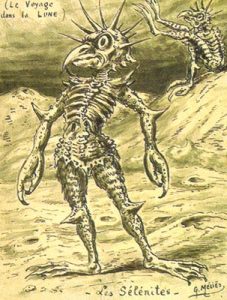The Sparrow by Mary Doria Russell
“Are not two sparrows sold for a penny? Yet not one of them will fall to the ground without your Father’s permission.” (Matthew 10:29)
In the not-too-distant future, an observatory in Puerto Rico picks up some chorales broadcast from the Alpha Centauri system. In response, a party of Jesuits and lay nerds sets out with the latest space travel technology (something to do with asteroid mining) to find and explore the singers’ planet, landing there in the Earth year 2039. The planet, Rakhat (did Russell think up this planet’s name while looking at a hat rack?) turns out to be not so very different from earth, with a human-friendly atmosphere and similar categories of plant and animal species. But unlike Earth, it has two species with language – predators and their prey who both evolved to stand upright, speak, and make stuff.
The vegetarian Runa speak Ruanja, a melodious language with good vowel/consonant balance. Their pronouns reflect their herd mentality: Runa refer to themselves only as “someone” or “this one” (“Someone’s heart is glad”, “This one is called Chaypas”) and have two forms of the first person plural: “One is exclusive of the person addressed. It means we-but-not-you. The other is we-and-you-also. If a Runao uses the inclusive we, you may be sure it is significant and you may rejoice in a friendship.”
Spatial concepts determine much of their grammar. The Jesuit star linguist and another team member spend their days pinning down the rules, for example that there are two declensions: one for things that occupy space and can be seen, the other for things that are inherently nonvisual (e.g. concepts such as “hope” or “affection”) or for things that occupy space but are not currently visible. If your friend is where you can see him, he takes the first declension for items that occupy space. Once he leaves, however, he becomes subject to the second declension, which leads one character to wonder “if a blind Runao would always use the nonvisual declension”. (I think I can answer that, actually – No, because in general the blind talk the same way people around them do. They don’t scrupulously avoid visual language. A blind Runao would change your visual/nonvisual declension based on whether you were nearby or not.) Words that seem to refer to objects often turn out to denote the spaces created by those objects, such as the empty space inside a vase. In addition, “there is a word for the space we would call a room but no words for wall or for ceiling or floor, as such. It’s the function of an object that is named. You can refer to a ceiling, for example, by noting that the rain is prevented from taking place in this space because of it.” I find this really implausible – creatures who build houses together are likely to have simple words for the component parts – but who’s to say how weird an alien language might be?

Russell worked out Ruanja in great detail; readers can suppose she built up a substantial file on its grammar and vocab, only some of which made it into the book. She gives us a taste of the carnivores’ language, K’San, but not as much detail. What stands out about K’San is that it has a lot of glottal stops, and its grammar is fiendishly difficult (for English speakers, at any rate).
The Sparrow includes some stomach-turning sexual violence, the reason for which is only fully explained in the sequel, Children of God. (It hinges on a miscommunication between two speakers who overestimate their mutual understanding.) Apart from language issues, these books explore faith and doubt, friendship and love, the ethics of eating, and of course all the usual sci-fi space travel questions. With minor quibbles (e.g. the dialogue can be too cute at times) I enjoyed both of them.